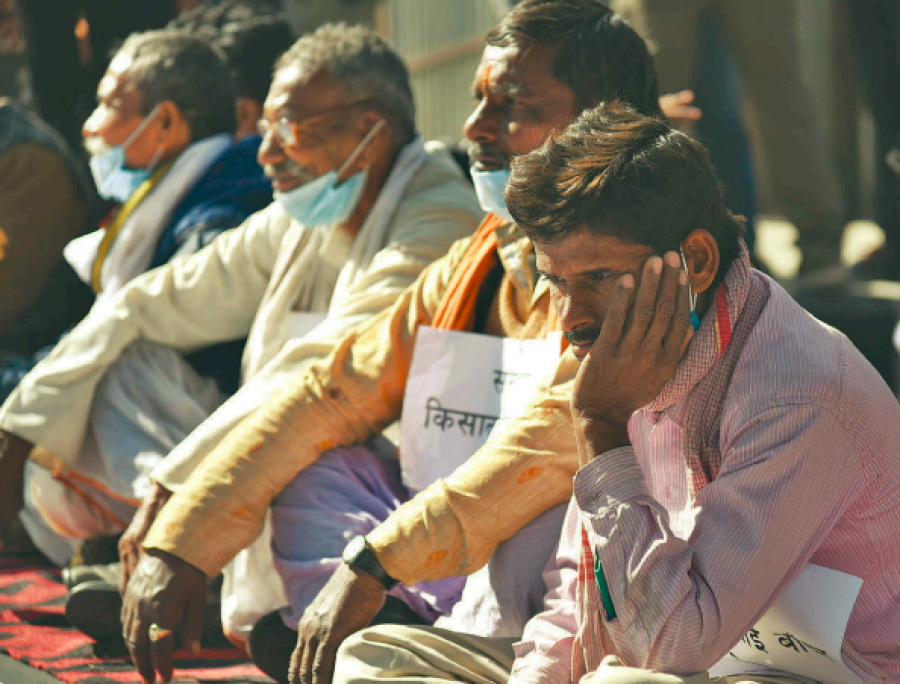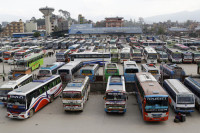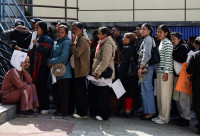National
Sugar mills are gradually clearing years-long dues, says government but farmers are not satisfied
With the deadline for payment on Monday, sugarcane farmers say they want to know how much each farmer has been paid. There are also differences on how much is actually owed.
Krishana Prasain
Siya Ram Raya Yadav, son of 72-year-old farmer Narayan who died from heart attack in Kathmandu a day after agitating sugarcane farmers ended their protest on December 28, is facing financial ruin.
The Yadav family had been selling the sugarcane they grew on their five bighas (1.2 hectares) of land to Annapurna Sugar Mills on credit for years but since the sugar mill did not pay them on time, Narayan was forced to borrow money for the family’s expenses and eventually had accrued more loans than the mill owned him.
The principal and interest on the loan the family owes to its creditors stands at Rs2.5 million. The mill has since paid Siya Ram Rs2.1 million out of a total Rs2.4 million dues.
“But I have nothing left now,” said Siya Ram from Chotaul of Dhankaul Municipality in Sarlahi. “We are planning to sell a piece of land to clear the bank’s loan.”
Sugarcane farmers had come to the Capital from December 13 to protest for the second time demanding that their outstanding dues be cleared. They called off their two-week-long protest on December 28 following assurance from the government that mills would pay them within 21 days. The deadline ends on Monday.
It was after the agreement was signed that Siya Ram got some of the payment as other farmers too have, according to the government.
Of the Rs 2.1 million Siya Ram received, he said he spent Rs1.2 million to organise his father’s funeral and Rs700,000 of the outstanding bank loan was paid.
Narayan Regmi, joint-secretary and spokesperson for the Industry Ministry, said based on their record, sugar mills have paid 85 percent of the outstanding dues to the farmers.
“Still 15 percent is remaining,” he told the Post. “The sugar mills have been gradually paying and I hope they will clear it all.”
But sugarcane farmers refute this claim.
Rakesh Mishra, patron of the Sugarcane Farmers Struggle Committee, which still exists despite the end of protests, said farmers have not received their payment fully yet.
“The Industry Ministry has shared verbally that the sugar mill has paid Rs440.5 million of the Rs650 million,” said Mishra. “But we do not know how many farmers have been paid and what amount they have been paid.”
According to him, the Industry Ministry has only said that sugar mills have deposited the dues to farmers’ bank accounts but have not provided any proof of that.
“How much a particular farmer should receive for what amount of sugarcane and how much has been provided needs to be mentioned clearly and this has not been done so far,” he said.
The sugar mills have not even clearly said how much they actually owe, Mishra said.
While farmers say that different sugar mills owe them Rs900 million in total, the government and the mills say they owe Rs650 million.
As part of the agreement signed on December 28, a technical team of a representative each from the Ministry of Industry, Commerce and Supplies, Ministry of Home Affairs, Ministry of Agriculture and Livestock Development, Ministry of Finance, and three from among sugarcane farmers—one each from the eastern, central and western parts of the country—was formed to look into this and other issues but the committee has met only once.
“We have proof that farmers have dues of more than Rs900 million no matter what the government concludes in its report,” Mishra said.
The farmers are confident that the government report will also conclude that this is the amount that is outstanding, according to him.
Last January too, an agreement had been reached between the government and the mills to clear the dues but that remained on paper only.
The Supreme Court has issued an interim order for the sugar mills to make the outstanding payments to sugarcane farmers within one month.
Justice Kumar Regmi issued the ruling on December 31 stating that payment to sugarcane farmers was directly related to their basic rights.
Siya Ram, meanwhile, is not very hopeful that the mill will clear the remaining Rs300,000 it owes.
Not getting the dues is only part of the problem sugarcane farmers face. They don’t get chemical fertilisers, such as urea, on time. Harvesting the crop and transporting it to the mills where it is crushed to make sugar adds to the cost. And if rains are not timely, sugarcane farmers suffer more.
When farmers finally get the sugarcane to the mills all they get is a slip of paper: that's what many farmers call a credit card.
Mishra said the government has promised them that once the deadline to clear the dues crosses, bank accounts of the defaulting mills will be frozen and an arrest warrant issued accordingly.
“Again, it looks like we may be forced to launch another round of decisive movement,” he told the Post. “We will hold a discussion on Tuesday to chart our plan.”




 19.69°C Kathmandu
19.69°C Kathmandu














